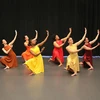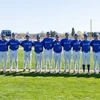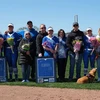Fredonia, N.Y. — Nov. 13, 2008 — The SUNY Fredonia Women’s Studies Program will be holding an event titled "Art and Activism: The Transgender Movement” on Nov. 19 at 7:30 p.m. in room 105 of Fenton hall. The presentation is free and open to all students, faculty, and the general public.
SUNY Fredonia professors will hold a panel discussion, relating transgender issues to their areas of study. A visiting artist and acclaimed art activist, Clarity Haynes, will also discuss her work in relation to the transgender movement.
Haynes uses soft drawing media on paper to create large-scale, classic portraits of women, focusing on the psychological and emotional states and the tensions within them.
“I am fascinated by the history of portraiture in painting and by the ways in which changing conventions reflect ideas about gender” said Haynes. “My portraits playfully refer to the past but explore contemporary reality, seeking to subvert traditional expectations and to convey a sense of freedom and fluidity of identity.” For more information on Clarity Haynes, visit www.clarityhaynes.com.
Haynes has two ongoing projects, “The Breast Portrait Project” and “The Beard Portrait Project,” which are collaborative feminist portrait projects that began in 1998. Both projects are a series of handwritten books-in-progress containing entries by almost 400 women, are the rich by-products of these projects. When portraits from these projects are exhibited, the books are always on view to provide a context.
Idea for program came from media arts major
“Over the past few months, the issues that kept coming up in my life were rights for transgender people as well as freedom of gender expression” said Jessica Whittam, a visual arts and new media major who designed the event. “Personally, I am not transgender but have always been a big believer in bridging social movements.”
Whittam grew up on Long Island and has painted nearly every day since she was 5-years-old. Her mother started her early with art and creative expression and now at 22, art has become a “second language” for her. She explained that she prefers to work abstractly because she likes to connect with raw emotions.
“I feel that even if certain movements seem separate, there are things that will always connect them” said Whittam. “The sooner people realize that we are all just people, the sooner we will be able to find equality within and outside of the movement.”



